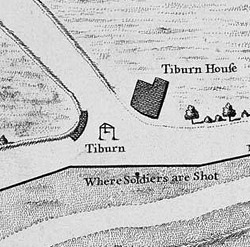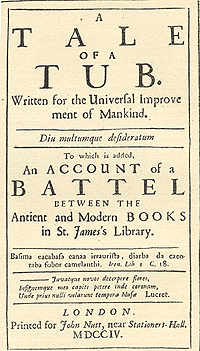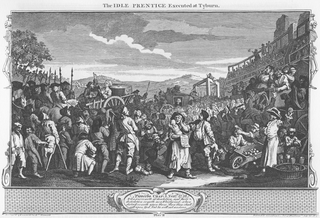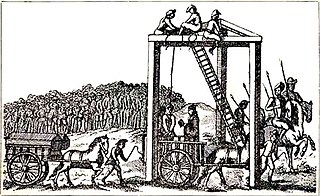Paul Lorrain (died 7 October 1719) was, for twenty-two years, the secretary, translator, and copyist for Samuel Pepys, and became well known as the Ordinary (chaplain) of Newgate Prison by standardising the publication of the gallows confessions of condemned prisoners. [1]
Lorrain was, by Pepys' account, of Huguenot extraction. [1] He was educated at neither of the English universities, but describes himself as presbyter of the Church of England. [2] He was taken on by Pepys as a secretary from 1678 and developed a close relationship lasting until Pepys's death in 1703. His responsibilities included transcription of records and cataloguing of Pepys's library; [3] during his employment, he also published a number of Protestant polemical and devotional tracts. In the 1690s, Lorrain's Protestant theological leanings, perhaps together with concern for his future arising out of Pepys advancing years, led him to the Church of England. [1]
He succeeded Samuel Smith, who died on 24 August 1698, as Ordinary of Newgate Prison, being appointed in September 1698. [lower-alpha 1] From his appointment until 1719 he compiled the official accounts of the dying speeches of criminals condemned to capital punishment and oversaw their printing in broadsheets; 48 of these broadsheets are in the British Museum. The confessions, to which are prefixed abstracts of Lorrain's 'funeral sermons,' are generally headed ''The Ordinary of Newgate, his Account of the Behaviour, Confession, and last Speech of X.,' &c. They were issued at eight o'clock on the morning following the execution, and signed Paul Lorrain, the public being warned against counterfeits and unauthorised accounts. [2] Lorrain standardised the layout of the Confessions, and zealously promoted the sale of his versions over competing unofficial broadsheets. He also benefited greatly from the publications, receiving some £200 per annum income from them, as compared with his remuneration as Ordinary, which with privileges amounted to some £65 per annum. [1]
Among the most notorious felons whom Lorrain attended to the scaffold were Captain Kidd (May 1701), Captain T. Smith, James Sheppard (March 1718), [5] Deborah Churchill (a "common strumpet" executed on 17 December 1708), [6] and Jack Hall (1707). On some occasions, when 15 or even 20 condemned persons were executed at once, the confessions are proportionately abridged.
In a joint letter from Alexander Pope and Bolingbroke to Swift, dated December 1725, the 'late ordinary' is described ironically as the 'great historiographer.' The penitence of his clients is always described as so heartfelt that the latter are playfully called by Richard Steele 'Lorrain's Saints'. [2] A number of questions were raised by Daniel Defoe as to the extent to which his polemical and commercial interests affected the authenticity of his Confessions. [1] Graham Harris, in his account of the execution of Captain Kidd, describes Lorrain as "a rather sanctimonious prig", quotes Bryant's view of Lorrain as "addicted to piety" and describes the Accounts as equivalent to the "gutter press". [7]
Lorrain died at his house in Town Ditch, London, on 7 October 1719. He is said to have left £5,000. His post, which was in the gift of the Lord Mayor and the Court of Aldermen, was keenly contested until 20 November when 'Mr. Purney, a young sucking divine of twenty-four years of age,' was elected 'at the recommendation of the very Orthodox Bishop of P——'. [2]
Besides several sermons, including one on Popery near akin to Paganism and Atheism, dedicated to Harley (1712), and a translation of Pierre Muret's Rites of Funeral (1683), Lorrain brought out in 1702 a little book, entitled The Dying Man's Assistant, dedicated to Sir Thomas Abney, Lord Mayor, in addition to which he published and advertised on the vacant spaces of his Confessions various small manuals of medicine, devotion, corn-cutting, &c. – probably his own compilations. [2] Other works include:

Tyburn was a manor (estate) in the county of Middlesex, England, one of two which were served by the parish of Marylebone. Tyburn took its name from the Tyburn Brook, a tributary of the River Westbourne. The name Tyburn, from Teo Bourne, means 'boundary stream'.

Newgate Prison was a prison at the corner of Newgate Street and Old Bailey Street just inside the City of London, England, originally at the site of Newgate, a gate in the Roman London Wall. Built in the 12th century and demolished in 1904, the prison was extended and rebuilt many times, and remained in use for over 700 years, from 1188 to 1902.

Conyers Middleton was an English clergyman. Though mired in controversy and disputes, he was also considered one of the best stylists in English of his time.

A Tale of a Tub was the first major work written by Jonathan Swift, composed between 1694 and 1697 and published in 1704. The Tale is a prose parody divided into sections of "digression" and a "tale" of three brothers, each representing one of the main branches of western Christianity. A satire on the Roman Catholic and Anglican churches and English Dissenters, it was famously attacked for its profanity and irreligion, starting with William Wotton, who wrote that it made a game of "God and Religion, Truth and Moral Honesty, Learning and Industry" to show "at the bottom [the author's] contemptible Opinion of every Thing which is called Christianity." The work continued to be regarded as an attack on religion well into the nineteenth century. One commentator complained that Swift must be "a compulsive cruiser of Dunghils … Ditches, and Common-Shores with a great Affectation [sic] for every thing that is nasty. When he spies any Objects that another Person would avoid looking on, that he Embraces".

Holy Sepulchre London, formerly and in some official uses Saint Sepulchre-without-Newgate, is the largest Anglican parish church in the City of London. It stands on the north side of Holborn Viaduct across a crossroads from the Old Bailey, and its parish takes in Smithfield Market. During medieval times, the site lay outside ("without") the city wall, west of the Newgate.

Jonathan Wild, also spelled Wilde, was a London underworld figure notable for operating on both sides of the law, posing as a public-spirited vigilante entitled the "Thief-Taker General". He simultaneously ran a significant criminal empire, and used his crimefighting role to remove rivals and launder the proceeds of his own crimes.

Allen Bathurst, 1st Earl Bathurst,, of Bathurst in the County of Sussex, known as The Lord Bathurst from 1712 to 1772, was a British Tory politician. Bathurst sat in the English and British House of Commons from 1705 until 1712 and then in the British House of Lords until his death in 1775, after being raised to the peerage as Baron Bathurst.

Execution Dock was a site on the River Thames near the shoreline at Wapping, London, that was used for more than 400 years to execute pirates, smugglers and mutineers who had been sentenced to death by Admiralty courts. The "dock" consisted of a scaffold for hanging. Its last executions were in 1830.
Alexander Dalzeel was a Scottish pirate and privateer who sailed in French service. Details on Dalzeel's early life - his career under pirate Henry Avery and exploits against the Spanish - appear only in Alexander Smith's 1720 collection "A Compleat history of the lives and robberies of the most notorious highwaymen," while his later activities are corroborated by newspaper accounts and trial records.

Christians were persecuted throughout the Roman Empire, beginning in the 1st century AD and ending in the 4th century. Originally a polytheistic empire in the traditions of Roman paganism and the Hellenistic religion, as Christianity spread through the empire, it came into ideological conflict with the imperial cult of ancient Rome. Pagan practices such as making sacrifices to the deified emperors or other gods were abhorrent to Christians as their beliefs prohibited idolatry. The state and other members of civic society punished Christians for treason, various rumored crimes, illegal assembly, and for introducing an alien cult that led to Roman apostasy. The first, localized Neronian persecution occurred under Emperor Nero in Rome. A more general persecution occurred during the reign of Marcus Aurelius. After a lull, persecution resumed under Emperors Decius and Trebonianus Gallus. The Decian persecution was particularly extensive. The persecution of Emperor Valerian ceased with his notable capture by the Sasanian Empire's Shapur I at the Battle of Edessa during the Roman–Persian Wars. His successor, Gallienus, halted the persecutions.
Edward Fitzharris was an Anglo-Irish conspirator. His prosecution following the waning of public belief in the Popish Plot hoax became a struggle for jurisdiction involving the courts and the two Houses of Parliament. He was executed for treason in 1681.
Henry Cornish was a London alderman, executed in the reign of James II of England.
Jack Hall was an English thief. He is the subject of a traditional British folksong "Jack Hall".
Charles Wogan (1698?–1752?) was a Jacobite soldier of fortune, also known as the Chevalier Wogan.
William Spiggot was a highwayman who was captured by Jonathan Wild's men in 1721. During his trial at the Old Bailey, he at first refused to plead and was therefore sentenced to be pressed until he pleaded. This was called Peine forte et dure. He was later executed, after a second trial when he pleaded not guilty, on 11 February 1721 at Tyburn, London.

The Ordinary of Newgate's Account was a sister publication of the Old Bailey's Proceedings, regularly published from 1676 to 1772 and containing biographies and last dying speeches of the prisoners executed at Tyburn during that period. The Accounts were written by the chaplain of Newgate Prison, recounting the statements made by the condemned during confession. Over 400 editions were published, containing biographies of some 2,500 executed criminals.

Thomas Cox, known as "The Handsome Highwayman", was an English highwayman, sentenced to death and hanged at Tyburn. He had a reputation for a spirited nature and it is reported that when asked if he wished to say a prayer before being hanged, he kicked the ordinary and the hangman out of the cart taking him there.
Samuel Smith (1620–1698) was a priest of the Church of England. He was educated at the Merchant Taylors' School and St John's College, Oxford. He then became rector of St Benet Gracechurch in 1656 but lost that position as a result of the Act of Uniformity 1662. He was subsequently most famous for being the Ordinary of Newgate from 1676. The Ordinary of Newgate was the prison chaplain who ministered to the prisoners. He heard their confessions before they were executed and Smith produced accounts of these which were published by George Croom as popular pamphlets.

Thomas Kingsmill was an English outlaw and one of the leaders of the notorious Hawkhurst Gang of smugglers that operated, from its base in Kent, along the South Coast of England from 1735 until 1749. One of the more infamous gangs of the early 18th century, they extended their influence from Hawkhurst, their base in Kent, along vast swathes of the South coast.

The Proclamation for Suppressing of Pirates was a royal proclamation issued by George I of Great Britain on 5 September 1717. It promised a pardon for acts of piracy committed before the following 5 January to those pirates who surrendered themselves to the correct authority before a deadline. Originally, the surrender had to occur on or before 5 September 1718; this was later extended by a second proclamation to 1 July 1719.